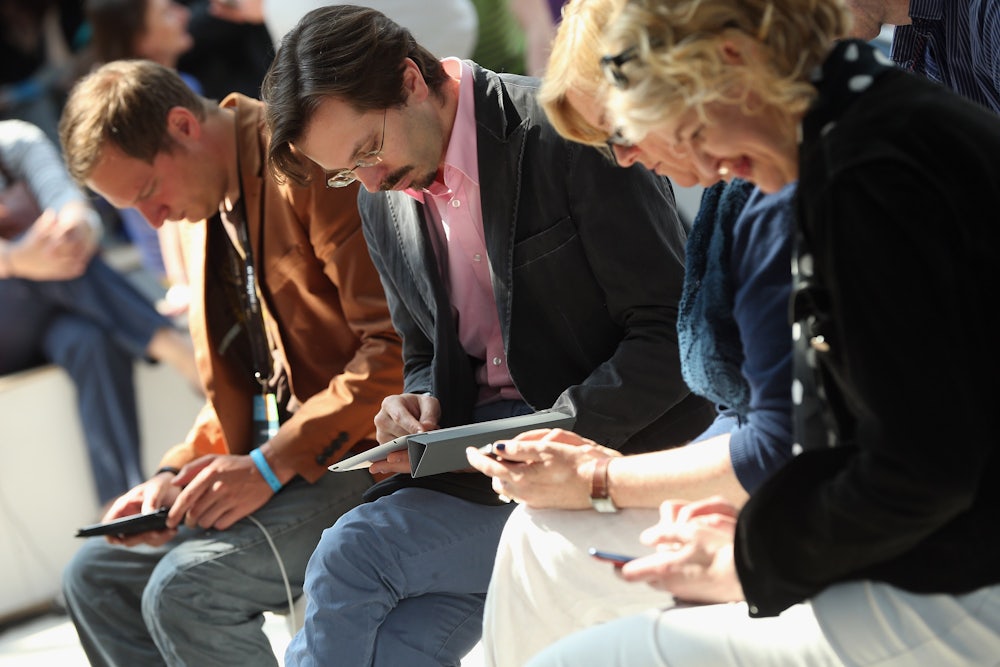The internet is obsessed with everything. Type “the internet is obsessed with” into Google and you’ll find a seemingly never-ending stream of what the internet is mad for: cats, new apps, Jennifer Lawrence, some show on Netflix, and, depending on the day, coffee or craft beer or natural wine. But it’s not just obsessed with objects, trends, and people: It loves things. It hates everything, (including, inexplicably, Renoir?). It has boyfriends, and always has a newest crush. It often kills things, and when it’s not doing that, it’s ruining them. The internet is apparently very busy.
The problem: “The internet” doesn’t exist, at least not in the way most people seem to think. Not only does referring to everything online as “the internet” mistakenly suggest that the digital is a space separate from the rest of life, but also, more importantly, it implies that the internet is a single sphere that we all share. (Which, if it needs pointing out, is something that simply cannot be true about a global technology used by hundreds of millions of people around the world.) It’s time to be far more careful about what we mean when we say “the internet.”
Calling online media and activity “the internet” made more sense before the 2000s. The web was emerging and becoming an increasingly important facet of modern, privileged, Western life, and a single term helped to give shape and character to what was often overwhelmingly new. The scarcity and high cost of internet access had the effect of favoring already privileged demographics, or fostering homogeneous communities. At the time—when discussion boards were dominated by (often white, male) Star Wars nerds and gamers—referring to everything online as “the internet” was a reflection of how early web users were comparatively less diverse than they are today.
That’s not to diminish the importance of heuristics; they’re often necessary shortcuts to quickly express how we feel. When I travel, I talk about the vibe of a city as a way to explain my experience as a tourist, even though I know a city is so much bigger than what I could experience in a week. When I describe New Delhi as chaotic, or call Vienna serene, it’s a way of framing my personal experience—and sometimes it’s worth sacrificing a bit of accuracy to be able to express myself more expediently.
But such generalization can obscure, and the same is true for when we talk about the internet as something separate from daily life. Beyond the obvious economic and social import of the web, the ongoing harassment and violence users (often women or minorities) are subjected to quickly does away with a mode of thinking that suggests the digital is distinct. Some scholars refer to it as digital dualism, and it obscures the way in that online life is ingrained in the other parts of living—the social, economic, and cultural spheres, which none would argue are somehow not part of real life.
More than that, though, there is a relation between chatter about “the internet” and a narrow perspective on the world. Headlines about what the internet is now obsessed with or in love with, in the English speaking world, are inevitably about the interests of a certain class of people in the West: NPR podcasts, Downton Abbey, Taylor Swift, and so on. Rarely does one see that the internet is also obsessed with the messaging app WeChat, which has around 600 million users around the world, the Bollywood smash hit Dilwale, or any other of the countless number of trends rocketing around the globe.
It’s the internet’s scale that makes the cultural use of the term so useless: The number of things happening online is almost literally countless. As such, one could gingerly suggest very general characteristics about the internet—say, that it affords for more interactivity than print, or that it’s changing business models—but claiming anything more specific than that is nonsensical.
As individuals, we construct our own private corners of the internet, believing ourselves to be in touch and of the moment. The least we could do is acknowledge life in its complexity—and stop talking about “the internet” as if the term still contains any meaning at all.
